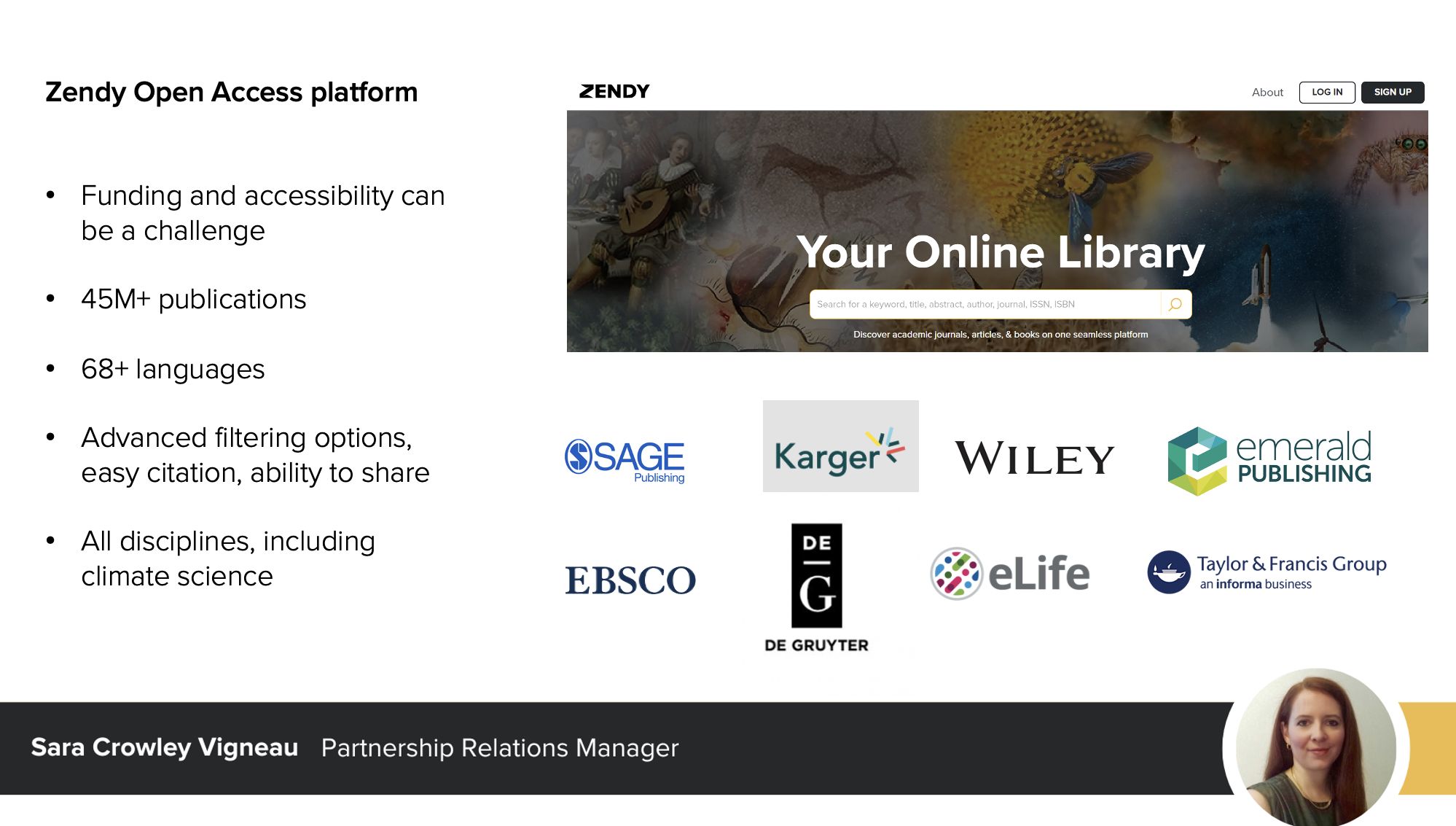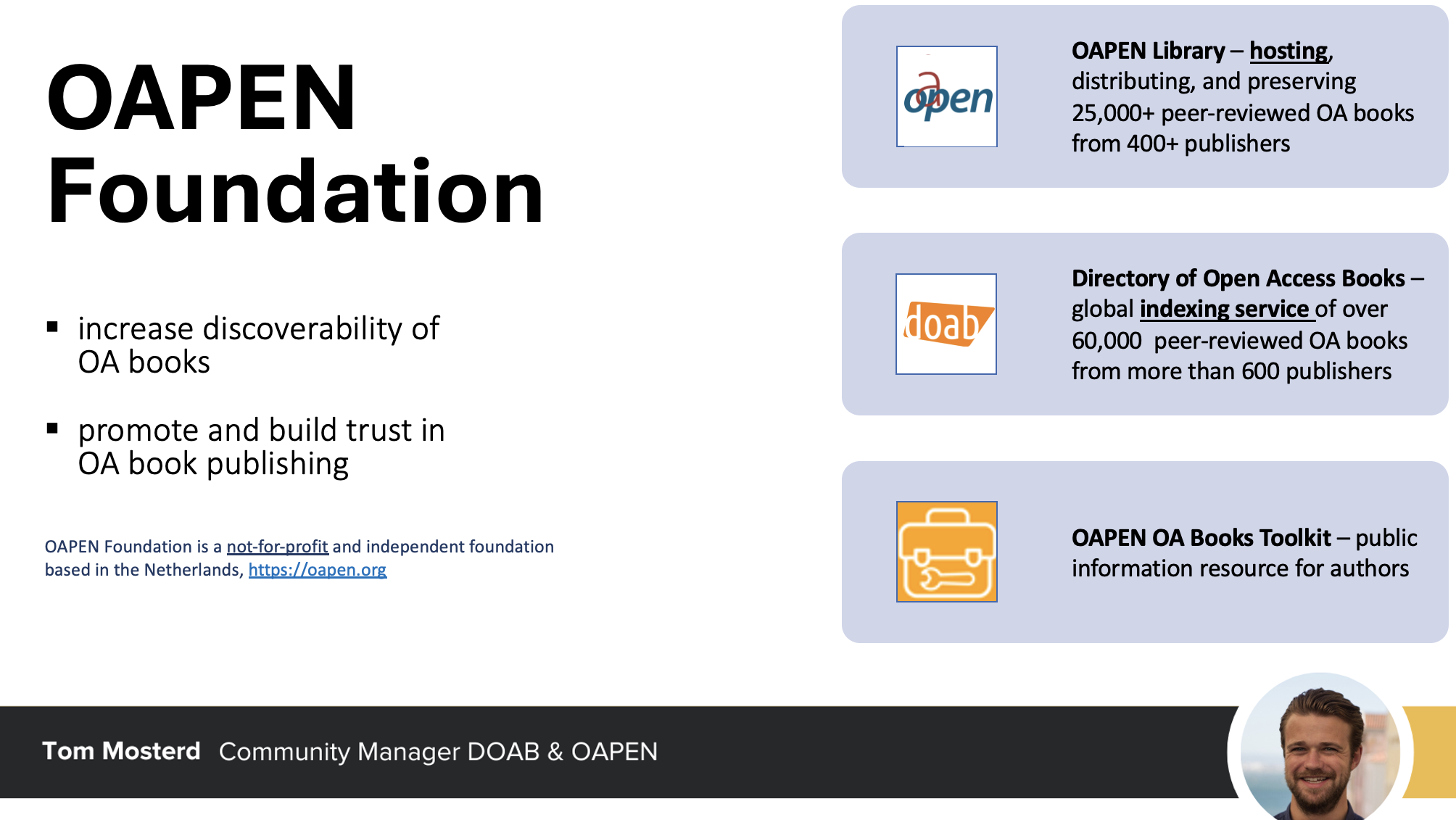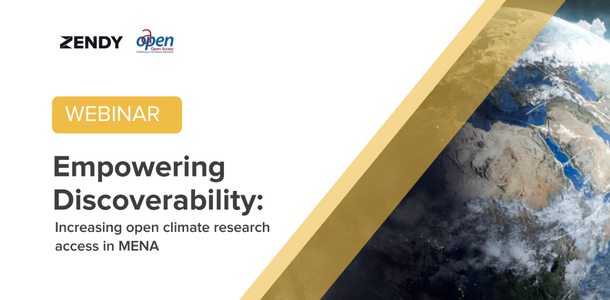In this collaborative webinar, Zendy and OAPEN teamed up at the start of Open Access week to discuss and debate the discoverability of open climate research in MENA.
The panel featured Knowledge E CEO & Zendy Co-founder Kamran Kardan, Zendy Partnership Relations Manager Sara Crowley Vigneau, Community Manager at DOAB & OAPEN Tom Mosterd, and authors Declan Conway and Marvin Brown. Open Access is vital in giving communities worldwide an opportunity to produce and disseminate knowledge about the climate crisis we are facing. Openness can create pathways to more equitable knowledge sharing and serve as a means to address the inequities that shape the impacts of climate change and our response to them.
Global accessibility to scientific content

Zendy Co-founder Kamran Kardan commenced panel discussions by describing the key challenge for individuals who want to access top scientific literature. In today’s publishing environment, individuals either need to be a member of an institution that has a subscription to these resources from the various publishers or part of an organization that may be part of a large consortium that may include access to certain databases.
This landscape has created significant inequality in access models for scientific information. Zendy’s mission to democratize access to scientific literature aims to make academic literature more affordable and accessible for individuals to learn and discover.
The pay-per-article model is not sustainable for independent learners. With single research papers ranging from $10 to $40 per download, vast global inequities have emerged in knowledge economies. Zendy’s hybrid subscription model, which provides individuals unlimited access for the monthly price of a single research paper, aims to help bridge the gap between access and affordability.
As Kamran discussed, challenges also exist in the Open Access framework. In a completely Open Access world, pockets of OA content exist across various platforms. This can make the research journey for individuals arduous. Zendy Open is a solution to accumulate this content for the user and present it on one easy-to-navigate platform.
In reference to the Sustainable Development Goals (SDGs), Kamran expressed that the key requirement for progress in climate action is through the power of knowledge.
See the entire discussion here: https://youtu.be/bVd28nSNhwA?t=196
Importance of useability and collaboration

Zendy Open is designed to make the accessibility of Open Access content easy for individuals from all walks of life. As Zendy Partnership Relations Manager, Partnership Relations Manager Sara Crowley Vigneau discussed, together with usability, partnerships play a central role in providing inclusive access.
Zendy aims to partner with a diverse group of top publishers to ensure individuals have wide-ranging access to over 45 million Open Access publications, available in over 68 languages. Sara discussed the correlation between the impact of the Open Access movement and SDG 4: equal access to education. The principles of Open Access also empower SDG goal 10 (fighting inequalities worldwide) and SDG goal 13 (climate action).
Climate research touches all aspects of our lives, from education to health, our notion of home to the societies we participate, and, importantly, our children’s future. The more industry participants collaborate to provide more visibility and ease of access to climate research, the better-informed individuals, thus creating more opportunities for participation in climate action.
Zendy’s collaboration with OAPEN means thousands of e-books, including hundreds of Open Access titles, are now available free on Zendy.
See the entire discussion here: https://youtu.be/bVd28nSNhwA?t=196
The role of books in the transition to Open Access

OAPEN promotes and supports the transition to open access for academic books by providing open infrastructure services to stakeholders in scholarly communication.
The OAPEN Foundation offers 3 services: the OAPEN Library, which hosts, distributes, and preserves over 25,000 peer-reviewed OA books, a global indexing service called DOAB, and an OA Books toolkit to help authors learn how to publish via OA channels.
As OAPEN & DOAB Community Manager Tom Mosterd discussed, books play an important role in the Open Access arena, especially in the subjects of humanities, social sciences, and, of course, climate justice. The OAPEN library features books from large publishers, as well as independent publishers from University Press’ from all around the world. The webinar showcased two authors who have for many years participated in the Open Access publishing process. They both provided insights about their books, which are now available on Zendy, and they shared their journey of why they publish Open Access.
Declan Conway: Climate Risk in Africa – Adaptation and Resilience
This OA book highlights the complexities around making adaptation decisions and building resilience in the face of climate risk. It is based on experiences in sub-Saharan Africa through the Future Climate for Africa (FCFA) applied research programme.
The insights inform new ways to promote action in policy and praxis by blending knowledge from multiple disciplines, including climate science, that provides an understanding of future climate risk and the social science of response through adaptation.
Read the book on Zendy now: https://bit.ly/3DqcIAZ
Marvin Brown: A Climate of Justice: An Ethical Foundation for Environmentalism
This OA book helps readers combine history, politics, and ethics to address the most pressing problem facing the world today: environmental survival. In A Climate of Justice, Marvin Brown connects the environmental crisis to basic questions of economic, social, and racial justice.
Brown shows how our current social climate maintains systemic injustices, and he uncovers resources for change through civic ethics of repair and reciprocity. A must-read for researchers and educators in the area of environmental ethics and those teaching courses in the fields of public policy and environmental sustainability.
Read the book on Zendy now: https://bit.ly/3h72DkE
